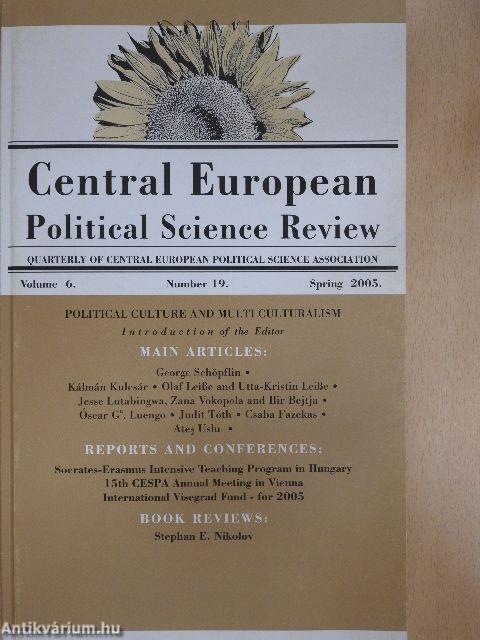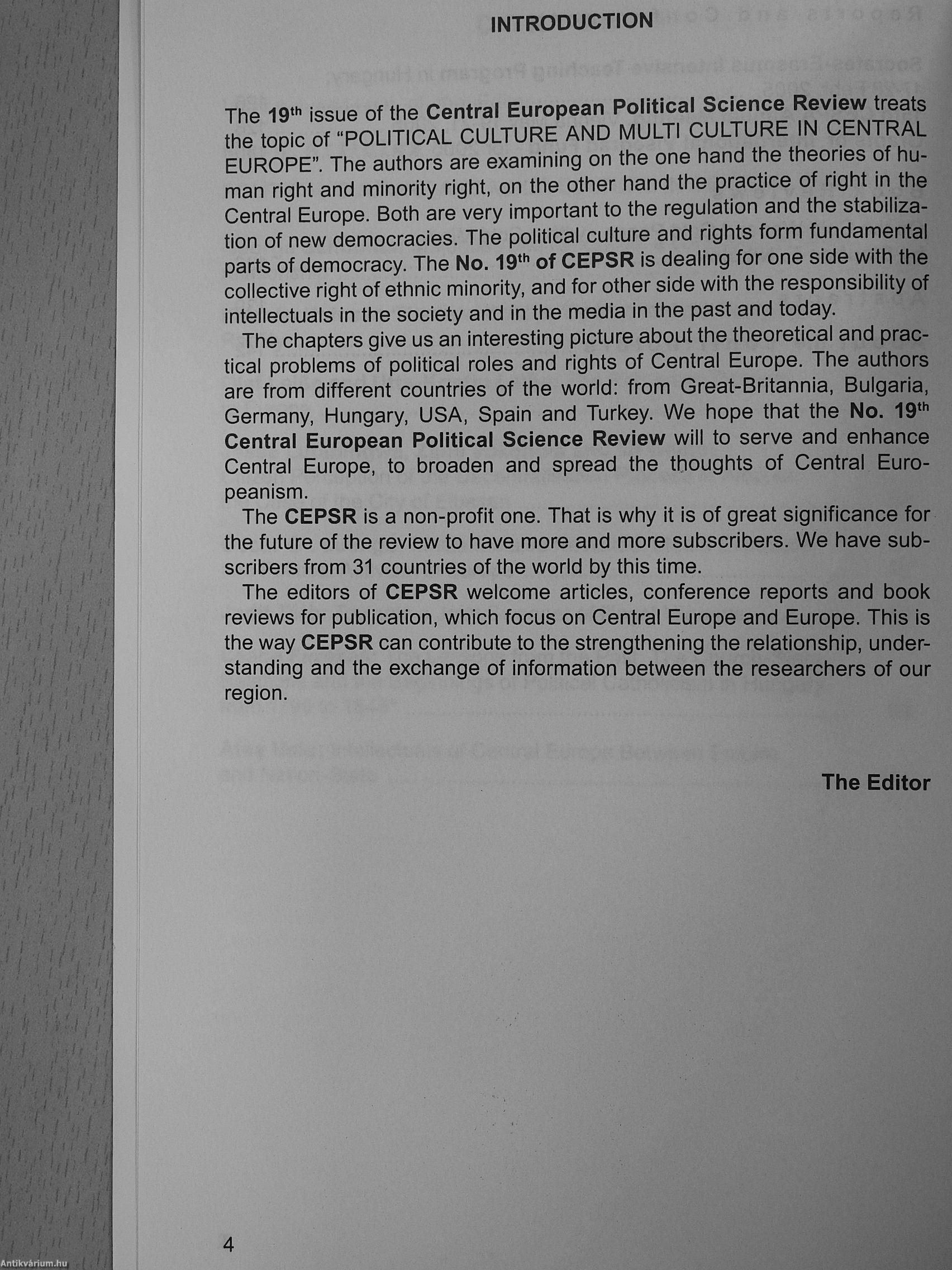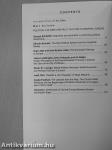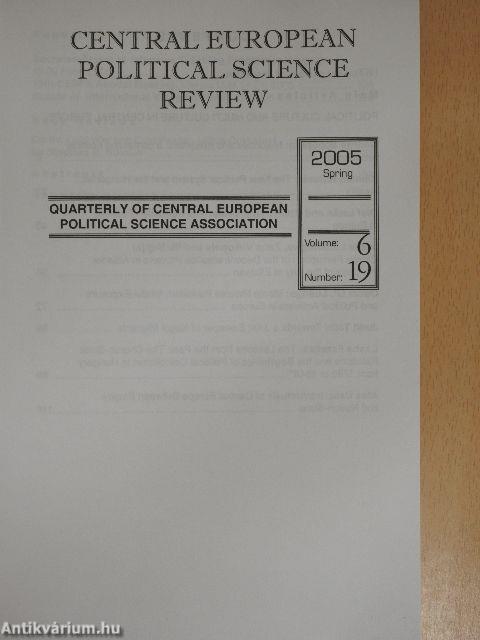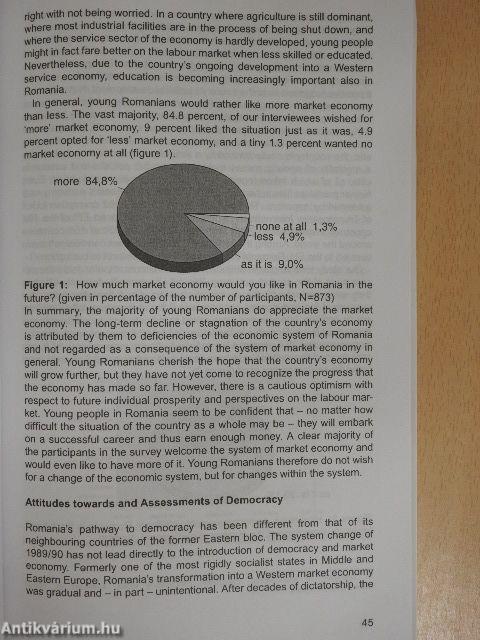1.061.470
kiadvánnyal nyújtjuk Magyarország legnagyobb antikvár könyv-kínálatát

VISSZA
A TETEJÉRE
JAVASLATOKÉszre-
vételek
Central European Political Science Review Spring 2005.
Quarterly of Central European Political Science Association/Volume 6. Number 19.
| Kiadó: | Central European Political Science Association |
|---|---|
| Kiadás helye: | |
| Kiadás éve: | |
| Kötés típusa: | Ragasztott papírkötés |
| Oldalszám: | 143 oldal |
| Sorozatcím: | Central European Political Science Review |
| Kötetszám: | |
| Nyelv: | Angol |
| Méret: | 24 cm x 15 cm |
| ISBN: | |
| Megjegyzés: | További kapcsolódó személyek a könyvben. Fekete-fehér ábrákkal. |
naponta értesítjük a beérkező friss
kiadványokról
naponta értesítjük a beérkező friss
kiadványokról
Előszó
TovábbFülszöveg
CENTRAL EUROPEAN POLITICAL SCIENCE REVIEW
Political Science Quarterly of the
Central European Political Science Association
The Central European Political Science Association, formed by the political science associations of Austria, Croatia, the Czech Republic, Estonia, Hungary, Lithuania Poland, Slovakia and Slovenia, decided at its annual congress to launch a new political science quarterly in September 2000, the
CENTRAL EUROPEAN POLITICAL SCIENCE REVIEW Central Europe passed through great changes after the fall of communism. Ten years after the transition, the democratic developments in the Central European countries produced many new achievements in the field of political science.
Aims of CEPSR
(1) The editors of CEPSR aim at supplying its readers with up to date information on the place and role that the Central European region has in an integrated Europe in the field of politics, economics, culture and structure.
(2) We intend to provide a forum for the appearance of... Tovább
Fülszöveg
CENTRAL EUROPEAN POLITICAL SCIENCE REVIEW
Political Science Quarterly of the
Central European Political Science Association
The Central European Political Science Association, formed by the political science associations of Austria, Croatia, the Czech Republic, Estonia, Hungary, Lithuania Poland, Slovakia and Slovenia, decided at its annual congress to launch a new political science quarterly in September 2000, the
CENTRAL EUROPEAN POLITICAL SCIENCE REVIEW Central Europe passed through great changes after the fall of communism. Ten years after the transition, the democratic developments in the Central European countries produced many new achievements in the field of political science.
Aims of CEPSR
(1) The editors of CEPSR aim at supplying its readers with up to date information on the place and role that the Central European region has in an integrated Europe in the field of politics, economics, culture and structure.
(2) We intend to provide a forum for the appearance of the results and conclusions of the best scientific works that treat the Central European region.
CEPSR will have thematic numbers.
Number 1: Central Europe in Europe Number 2: Political Parties and Movements in Central Europe Number 3: Political Transition and Transformation in Central Europe
Number 4: Political Representátiöh71rTstitutiohs^ahd Actors Number 5: Globalisation, Regionalisation and Nations In Central Europe Number 6: The Euro-Atlanti Integration, Attitudes and Orientations Number 7: Political Representation Actors and Institution Number 8: Political Parties and European Integration Number 9: The Future of Europe - Central European Perspectives Number 10; The Process of Stabilization of Democracy in Central Europe Number 11: The Role of Media in Central Europe and in Europe Number 12: Participation, Movement and Human Rights Number 13: Political Parties and the European Enlargement Number 14: EU Enlargement and Cleavages in Central Europe Number 15: Lessons from History and EU Accession for Central Europe Number 16: Minority's Status Laws in the European Union and in Hungary Number 17: European Standard of the Rights Number 18: Public Policy in Central Europe Number 19: Political culture and multiculturalism
The editors of Central European Political Science Review therefore w,elcome the articles of political science researchers in the world, wich are related to the Centralii.European region or which carry a message for these countries. For further information about contribution and subscription: contact the editor Janos Simon at CEPSR@mtapti.hu Visit our Website at: www.CEPSR.hu www.CEPSR.com Vissza
Témakörök
- Idegennyelv > Idegennyelvű könyvek > Angol > Folyóiratok, újságok
- Idegennyelv > Idegennyelvű könyvek > Angol > Történelem > Európa története > Egyéb
- Folyóiratok, újságok > Történelem
- Történelem > Folyóiratok, közlemények, évkönyvek > Külföldi
- Történelem > Idegennyelvű > Angol
- Történelem > Politika > Egyéb
- Történelem > Legújabb kor > Globalizálódó világ
- Történelem > Kontinensek szerint > Európa, európai országok története > Közép-Európa > Egyéb



